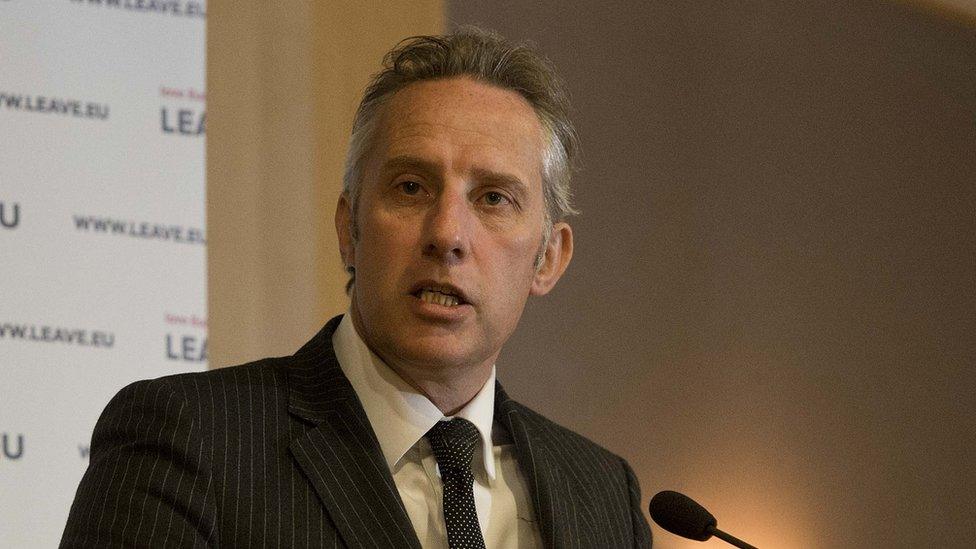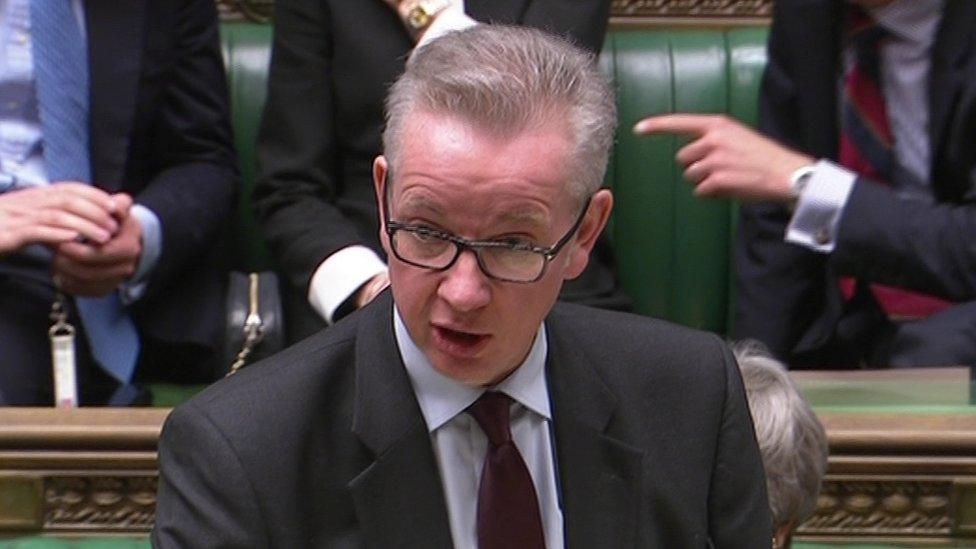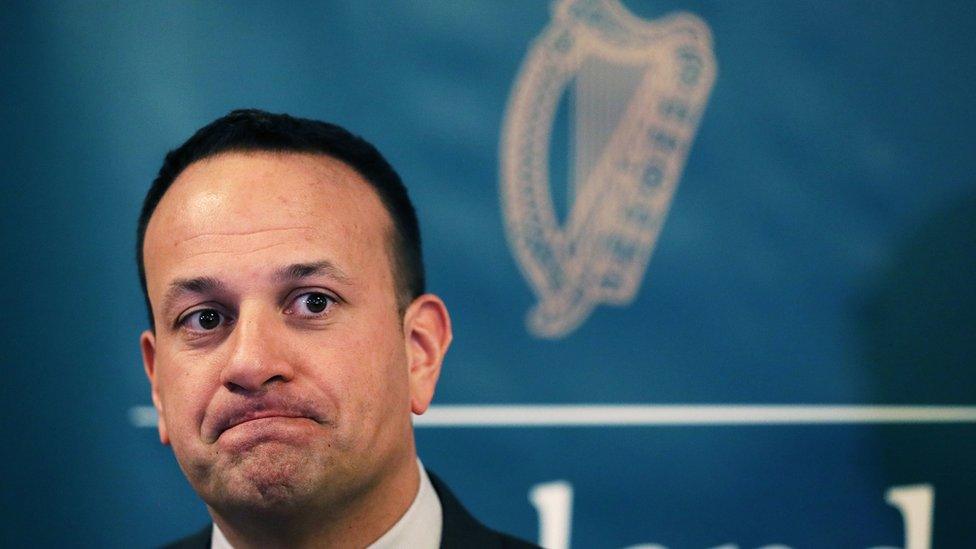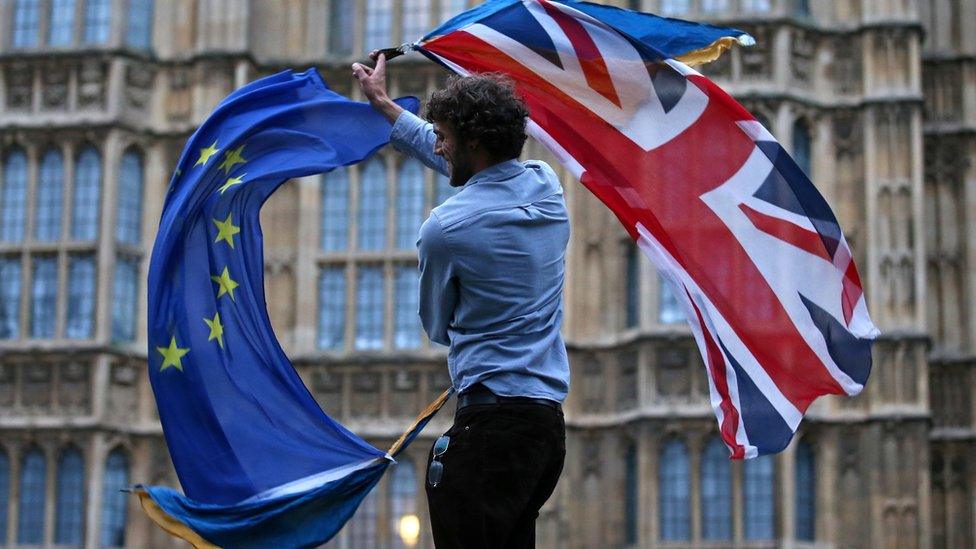Brexit: Ian Paisley warns over no-deal direct rule comments
- Published

Ian Paisley called on Mr Gove to clarify his remarks in Parliament
A DUP MP has described comments by Michael Gove that a no-deal Brexit could lead to Dublin having more involvement in NI as "insulting".
Northern Ireland has been without a government since January 2017 after a row between the power-sharing parties.
Speaking in Parliament, Ian Paisley asked if Mr Gove "misspoke".
On Wednesday, Mr Gove, the environment secretary, told MPs that if the UK left the EU without a deal, a form of direct rule would be a "grave step" the government would have to consider.
Ministers would have to start "formal engagement with the Irish government about providing strengthened decision-making in the event of that outcome", he added.

Michael Gove has warned a no-deal Brexit could lead to the re-introduction of direct rule for Northern Ireland from Westminster
But Mr Paisley, the Democratic Unionist Party (DUP) MP for North Antrim, claimed Mr Gove had "basically said that more powers would be given to Dublin to be exercised over Northern Ireland".
He warned cabinet minister David Lidington: ""The minister will know how insulting that is to the members who sit on this bench, and... it's the members who sit on this bench that keep his party in power."
The DUP's 10 MPs ensure the Conservative Party has a majority in Parliament through a confidence-and-supply arrangement.

Northern Ireland and direct rule
Northern Ireland was ruled directly from Westminster between 1972 - when the Northern Ireland Parliament was prorogued - and 1999 when the new power-sharing assembly was established.
Direct rule was introduced again on a number of periods when power-sharing broke down, including between 2002 and 2007.
The system has so far not been reintroduced during the current impasse, but some have accused the Northern Ireland secretary of presiding over "direct rule in all but name".
Some politicians and commentators have also argued that "a form of" direct rule has been happening in Northern Ireland for some time now, albeit at a slow, drip-like pace.
The Northern Ireland Secretary Karen Bradley has passed two budget bills for NI through the Commons, and has taken appointment powers usually reserved for Stormont ministers including that of the Attorney General for Northern Ireland.
The UK government has said its priority remains on restoring devolution, but until then it must take some decisions to ensure good governance.

Mr Paisley called on the minister to clarify Mr Gove's remarks and confirm that "there will be no involvement in the internal affairs of Northern Ireland and its governance".
Mr Lidington - Mrs May's second-in-command - said he would make sure Mr Gove was made aware of Mr Paisley's comments so he could consider if he should make any further comment.
"There are absolutely no plans at all to transfer additional powers or rights to the government of Ireland," he added.
Allow X content?
This article contains content provided by X. We ask for your permission before anything is loaded, as they may be using cookies and other technologies. You may want to read X’s cookie policy, external and privacy policy, external before accepting. To view this content choose ‘accept and continue’.
Meanwhile in Washington DC, the head of Northern Ireland's civil service has said there is no realistic alternative to politicians sharing power at Stormont and he is "confident we'll get there".
David Sterling has been in charge of the government departments running Northern Ireland in the absence of executive ministers.
Stormont's collapse: Punchline politics no laughing matter?
He described the current situation as a "draft administration", and told politicians at a business breakfast he hoped he would not be addressing them next year, but rather sitting in the audience listening to them.
DUP leader Arlene Foster and Sinn Féin President Mary-Lou McDonald were among those present.
- Published14 March 2019

- Published13 March 2019

- Published30 July 2019

- Published9 March 2019

- Published16 October 2019
